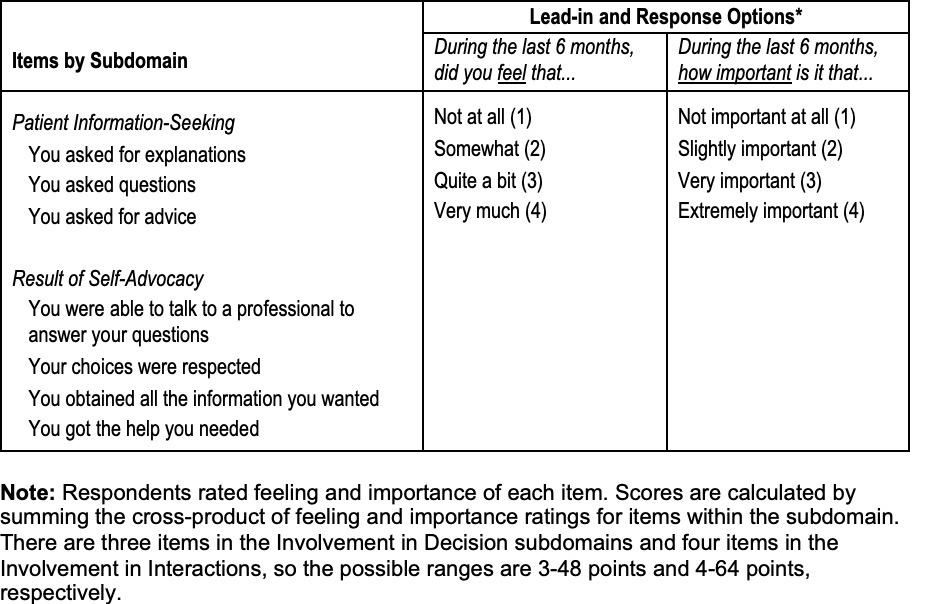Session Information
Session Type: Poster Session D
Session Time: 9:00AM-11:00AM
Background/Purpose: The Health Care Empowerment Questionnaire (HCEQ) was developed for use in a general sample of patients to measure individual empowerment in health care and services (Gagnon et al., 2006), which can be considered an aspect of experience of care. The aim of this study was to validate the HCEQ, a patient-reported experience measure (PREM), for use with patients with arthritis and other rheumatic diseases by assessing its psychometric properties.
Methods: Data were collected from a convenience sample of adults with arthritis through online surveys administered between March 2019 to March 2020 through the Arthritis Foundation’s LiveYes! INSIGHTS program. Experiences and importance of patient empowerment were measured using two domains of the HCEQ: Involvement in Decisions (6 items), which we call Patient Information Seeking, and Involvement in Interactions (8 items), which we call Result of Self-Advocacy. A larger sample was used to assess HCEQ internal consistency through Cronbach’s alphas for each of the two subscales, as well as its measure structure through a confirmatory factor analysis (CFA; n=9229). A sub-sample of participants meeting inclusion criteria, including having completed the survey twice within 7 to 14 days, was used to assess test-retest reliability through Pearson correlation coefficients (n=186). Information on face validity was gathered from another sample of patients through qualitative data collection methods (n=5-59).
Results: After appropriate modifications, the CFA indicated good fit to the data for the two-factor structure of the HCEQ with this population, according to model fit indices (RMSEA = .047; CFI = .997; TLI = .993; SRMR = .012). The exception was the chi square, which was significant (X2 = 214.150, p < .001), though this is susceptible to error when there are large sample sizes, as is the case here. Internal consistency was strong, with a Cronbach’s alpha of .94 for both Patient Information Seeking and Result of Self-Advocacy. Test-retest reliability was moderate for Patient Information Seeking (r=.67) and good for Result of Self-Advocacy (r=.77). Qualitative data analysis indicated adequate face validity of the HCEQ for patients with arthritis.
Conclusion: The HCEQ demonstrates promising psychometric properties when used with a sample of patients with arthritis and other rheumatic diseases. This lays the foundation for future work assessing additional psychometric properties of the HCEQ and examining patients’ experiences with and desire for empowerment both for individuals with arthritis and in comparison to individuals with other conditions.
 Subdomains of the HCEQ, including items on each subdomain, lead-in to the items, and response options.
Subdomains of the HCEQ, including items on each subdomain, lead-in to the items, and response options.
To cite this abstract in AMA style:
Knight-Zhang E, Carluzzo K, Schifferdecker K, Creek E, Butcher R, Eakin G. Assessing the Psychometric Properties of a Measure of Patient Empowerment with Patients with Arthritis [abstract]. Arthritis Rheumatol. 2020; 72 (suppl 10). https://acrabstracts.org/abstract/assessing-the-psychometric-properties-of-a-measure-of-patient-empowerment-with-patients-with-arthritis/. Accessed .« Back to ACR Convergence 2020
ACR Meeting Abstracts - https://acrabstracts.org/abstract/assessing-the-psychometric-properties-of-a-measure-of-patient-empowerment-with-patients-with-arthritis/
